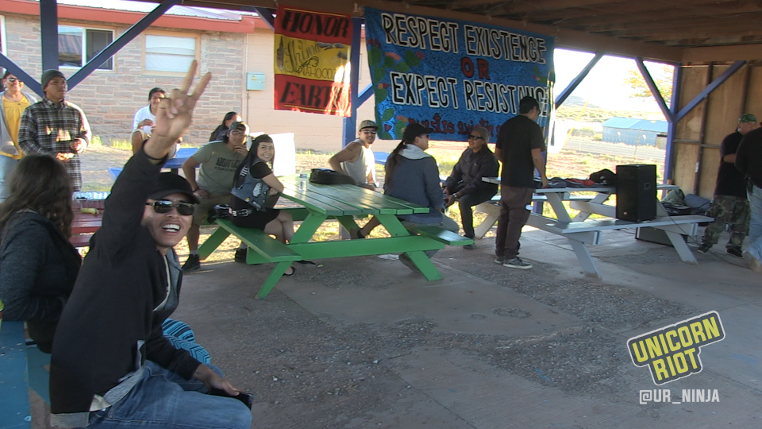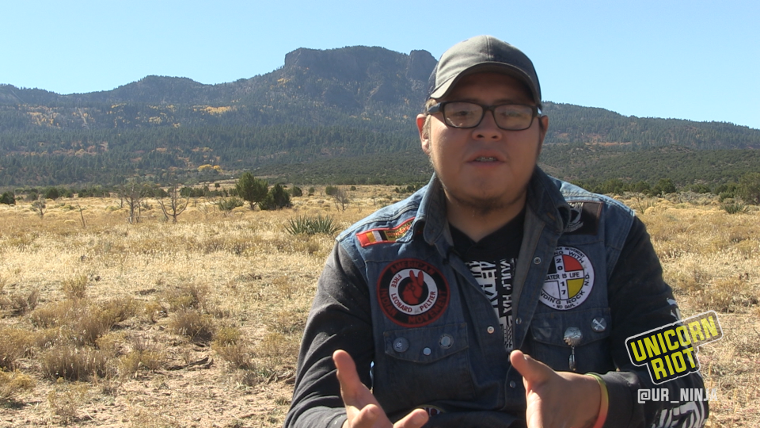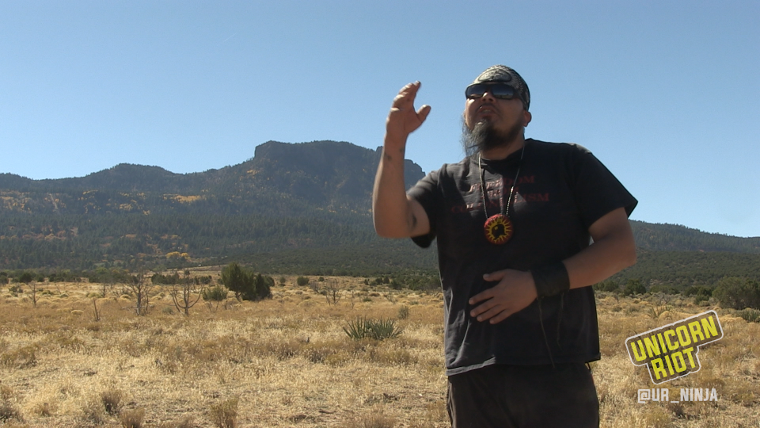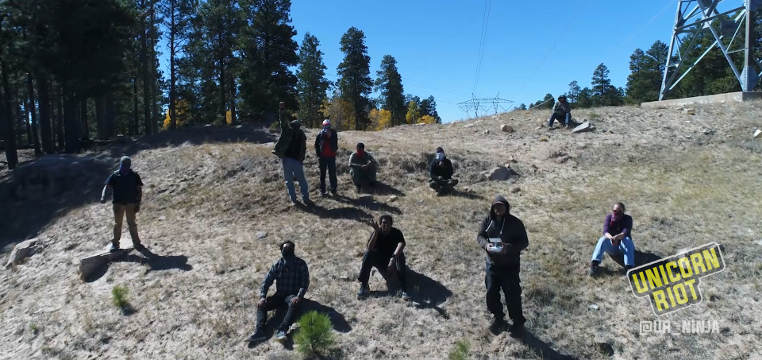Defend Dinetah, a Festival to Raise Awareness of Fracking on the Navajo Nation
Red Valley, AZ – On October 13, 2017, Unicorn Riot attended an event called “Defend Dinetah” held in the Red Valley Chapter of the Navajo Nation. We spoke with Christian J. Johnson and Bobby Leonard Mason, who helped organize what Bobby called “a small festival” made up of indigenous musicians, food, and video presentations. We learned about their work to ban fracking on the Chuska mountains and their hope that “Defend Dinetah” would provide a place for the local community to talk about banning resource extraction in the Navajo Nation.
Defend Dinetah, a Festival to Raises Awareness of Fracking on the Navajo Nation from Unicorn Riot on Vimeo.
The Defend Dinetah event featured musicians like Bishop Underdog, whose lyrics were filled with references of resistance and a future for their people: “I’d fight now for my future grandchild. Fight to my death, so they have the cleanest first breath.”
Def-I, another musician, thanked everyone for coming to defend the mountain that he grew up on. Preston Johnson played guitar and sang, asking “Whatcha gonna do when a Black Snake comes to your town?” and referenced being tear gassed and shot with rubber bullets at Standing Rock while they tried to defend those lands against the Dakota Access Pipeline.

The concert’s intermission featured food and videos of land defense actions. Many people present had been at Standing Rock to help the Lakota people defend their water against resource extraction.
One of the speakers shared their experiences, and extended warnings that things will get bad if they defended their land. They pointed to Standing Rock, where mass resistance was dispersed through a federal and corporate counter-insurgency campaign backed by militarized police forces.
The same speaker suggested that those present needed to also talk about the bad that happened up at the camps. She said, “Women were raped up at that camp, and that’s something that I never hear talked about, anywhere I go when I hear people talk about Standing Rock.”
She followed up her statement by saying:
We have to ensure that in these camps and these spaces, that our women are held sacred. Because this is a movement of Mother Earth. Water is life. The women are the water.”
Her statements resonated with those gathered, and she was applauded and thanked for speaking.
https://vimeo.com/374799670
https://vimeo.com/374798832
https://vimeo.com/374798592
https://vimeo.com/374796952
After the event we camped a few days on the Chuska Mountains, then sat down with Christian Johnson, who explained that they were currently at the beginning part of the process of banning fracking on Dinetah. He hoped that the event acted as outreach for his community of Red Valley, and provided an avenue for people to come ask questions as he tried to pass a resolution that would ban fracking in the Red Valley Chapter of the Dine Nation.

Christian Johnson felt that,
“If other places can make it illegal to drill, I’m pretty sure we Dine people, we can come together and protect our lands, and get it back on the road the way it was before these companies started coming back out.”
Christian referenced a growing list of counties and states, like New York and Maryland, which have banned fracking. He said that his brother, Bobby Leonard Mason, had already passed the resolution in Lukachukai Chapter, and they hoped to adopt it in Red Valley Chapter. He was told that if he could get 55 chapters of the 110 to sign onto the resolution it would mean the Navajo Nation would adopt it within their territory.
Among the list of reasons for wanting to ban fracking, he mentioned elders who had worked on these sites having long-term health effects, and that the mountains themselves now have strong smells of hydrogen sulfide (H2S) gas common near fracking sites, which has the odor of rotten eggs.
When we asked what got Bobby Leonard Mason into organizing against fracking on the mountain, he said that his family had negatively been affected by resource extraction industries. He’s also been noticing a lot of machinery coming and going for the past five years.

When he spoke to his elders, he learned that companies had been fracking in the area since the sixties, and said that even though his elders opposed it, that they were ignored.
“Our relatives don’t need these companies to blend into the background and become part of the scenery like the mountain. I think it’s important that we fight these colonial industries coming in that are based around destroying the Earth and desecrating our sacred sites.” — Bobby Leonard Mason
He went on to say that the struggle against fracking in the area came alongside a long history of relatives lost to the sickness coming from abandoned Uranium mines.
Along with his goal of getting all resource extraction banned from ancestral territory, Christian hopes that other camps know what’s going on here on the Dine people’s land. The “Defend Dinetah” event brought supporters from California, Washington State, Phoenix, some street medics from Prescot, AZ and folks from the local area.
After our visit to the area, on December 4, 2017, the Trump presidency reduced the size of Bears Ears National Monument, “a sprawling region of red rock canyons, by 85 percent” and basically halved the size of Grand Staircase-Escalante National Monument. The move to majorly diminish federal protection of land opens more Dine ancestral territory to fossil fuel extraction.
While the Defend Dinetah event was to bring attention to fracking on the Chuska mountains, resource extraction continues to expand as fossil fuel companies search for more fossil fuels in previously-protected areas. It’s uncertain how the attempts to ban fracking will fare on the Dine Nation, but it seems certain that the resistance will continue to grow.
To help our volunteer operated, horizontally organized, non-profit media organization, please consider becoming a monthly sustainer with tax-deductible micro-donations:



